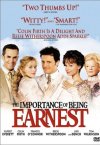BUY THE DVD:
|


|
|
|
SYNOPSIS:
| |
in 1890s london, two friends unwittingly use the same pseudonym for their on-the-sly activities.
|
|
|
MOVIE FACT:
| |
this film had a budget of 15 million dollars.
|
|
|
RATING:
|



three out of four possible stars
|
|
|
|
A comedy of witty repartee with light-hearted acting and somewhat shallow character development, the importance of being earnest will attract viewers who are fans of dialogue heavy period films, but may repel audience members interested in explosions and the like. Indeed, this film must rely on its costume designs and the abilities of its actors to keep the flow of the story entertaining. And the actors are up to the task, it seems, because after a few moments of awkward exchange between Rupert Everett and Colin Firth's characters, the movie begins an hour and a half long spurt of fun dialogue which elicits more than a few laughs from the audience. Some of the best lines on screen pop in this movie.
And much of the entertainment factor of this film comes from Judi Dench, who plays a truly supporting role in which she's only on screen in a few scenes, but shows up most of the other actors every single time she speaks. It's something about her delivery and the cadence of her speech, which renders all other activity in the room less interesting. Though Everett and Firth both have superior acting talents, Dench just fills the room with her attitude and voice. If anything, this film is valuable because of her involvement in the picture. And the dialogue seems to have been written especially for her, even though some of it came from the Oscar Wilde play of the same name, Dench is at home with every sentence. She plays the regal and imposing Aunt Bracknell with as much intelligence as she has a number of her previous pictures, including her characters in Shakespeare in Love and Mrs. Brown.
But though she is a dominant part of the cast, even though her role is a small one, the other actors in the film should be congratulated as well for being able to hold their own against that formidable actress. Reese Witherspoon, who hasn't been involved in the most classical pictures, fits in well with the constricting attire and the English accent. The other members of the cast seem to be hired with intelligence by the casting director as well. Though their characters are a little stilted at first, both Colin Firth and Rupert Everett carry off the requisite wit of an Oscar Wilde play with increasing agility as the movie progresses. Both characters are immediately likeable and remain so for the rest of the movie.
And Frances Connor, who has shown quite a variety in acting skills with her past roles, blends in well with the cast as well. Everyone in this film seems to really inhabit their roles as if each part was written specifically for them. But therein lies one problem. These actors play characters that have a lot of dialogue, but not a lot of history. Of course, this film is based on a play, so the lack of back story is to be expected, but, given that the director (or perhaps it was the writer) decided to change parts of the play to adapt well to the screen, giving the characters more of a history, might have made the film more whole. As it is, the dialogue is wonderfully witty, but the characters are quite thin.
And the film isn't too long, so filling out some of the characters would not have been out of the range of possibility. But, even though the film lacks the deep characters of the traditional period film, that delinquency doesn't have to be looked at as a failing. In point of fact, the film might be accessible to more than just fans of Oscar Wilde if audiences can expect a light and funny picture that doesn't start to resemble the more depressing period novels about England. And the greatest strength of Oscar Wilde’s plays is the dialogue, so for the filmmakers to have focused on this aspect might have been an intelligent move. Because the end product is quite an entertaining movie. And though it never moves beyond that, the experience is still a valuable one in the theater.
Owing to the equally good acting and dialogue, this film presents a story which is easy to understand, and not at all high-handed. Scholars of English literature and fans of historical plays aren't the only people who can benefit from this movie. There are no explosions or car chases, but as a comedy, the deliveries of these actors are, at their basest level, entertaining. This film skips over the more depressing elements of turn of the century England, like the poverty of the lower classes and other assorted evils, in favor of hilarity and a few witty speeches. Which is much to the film's benefit, because as a comedy, this film is quite successful.
Review by Kelsey Wyatt.
| |
|